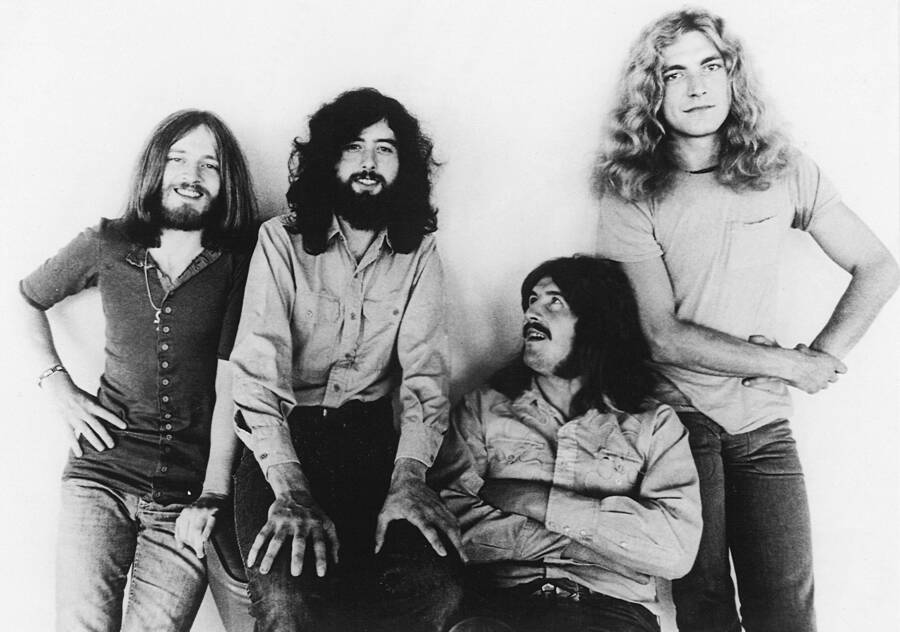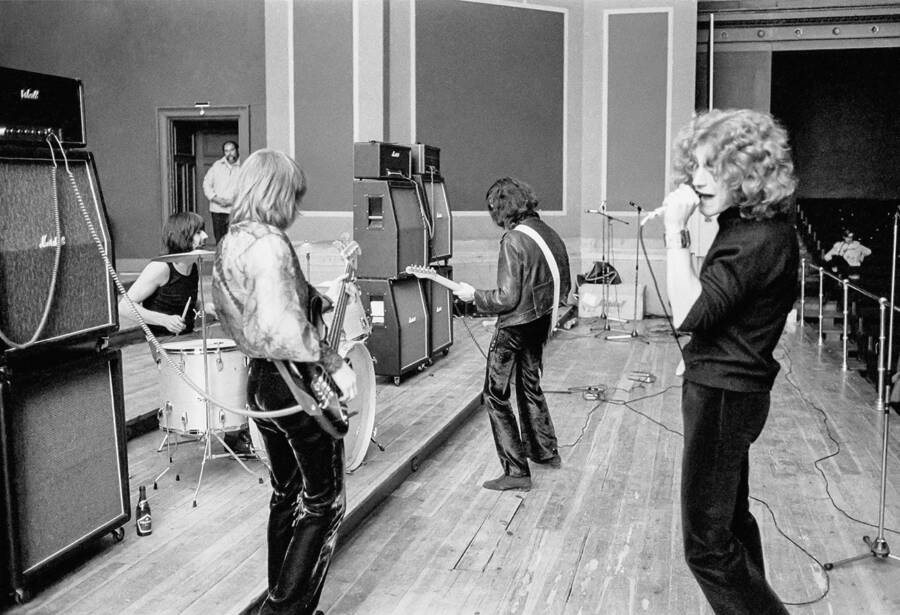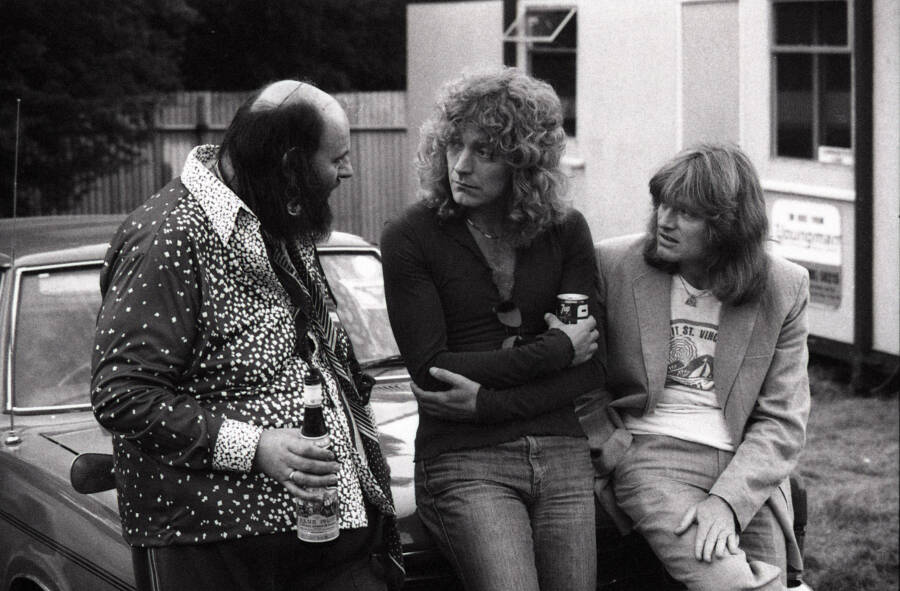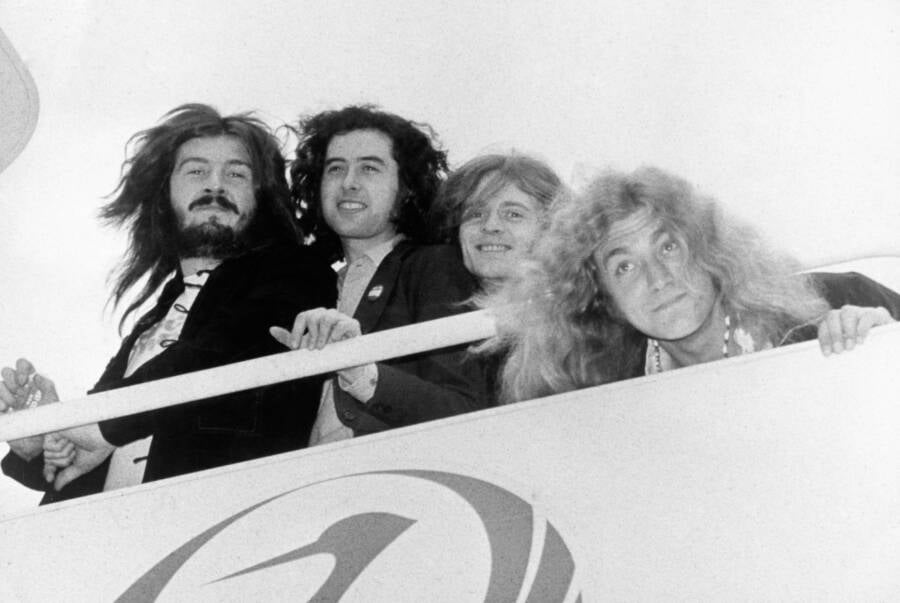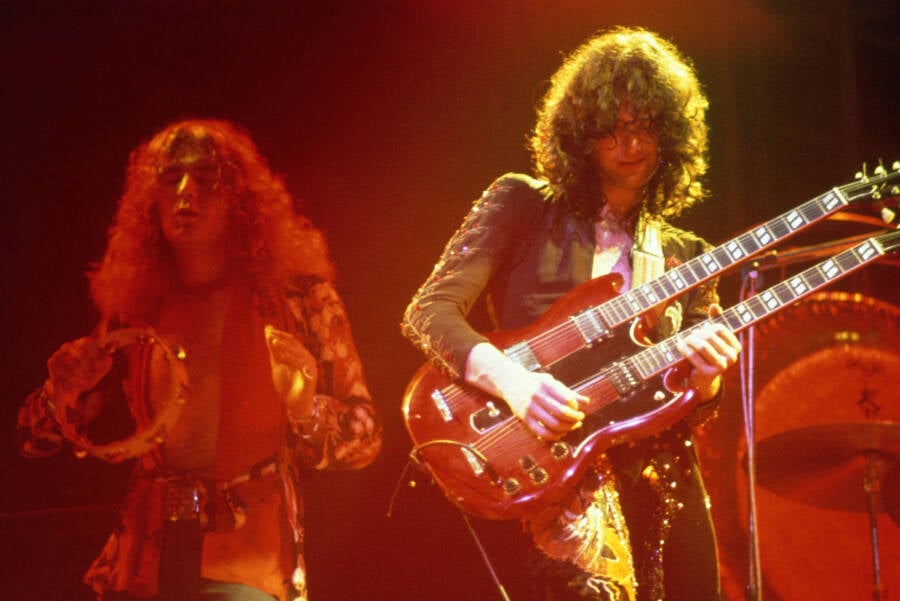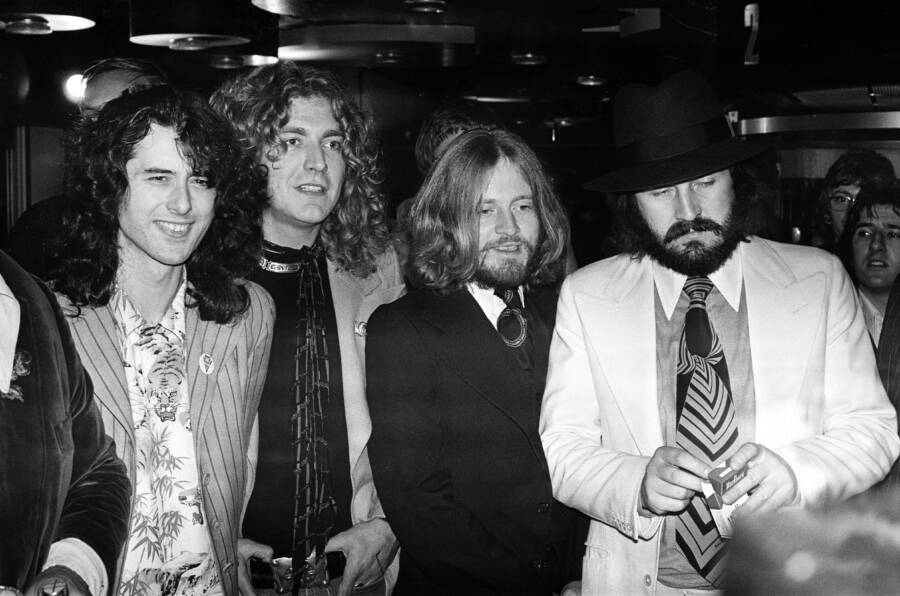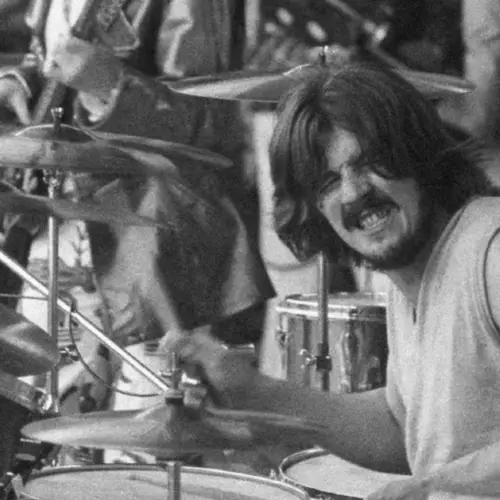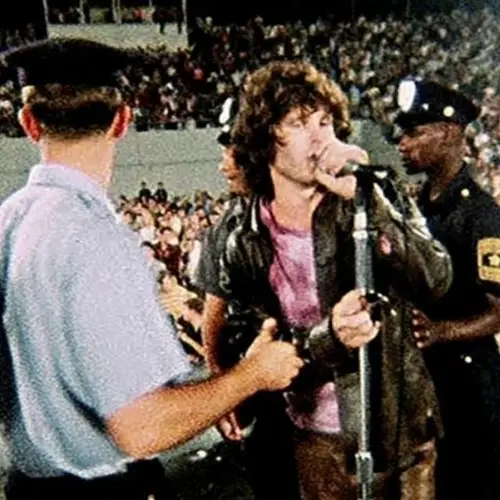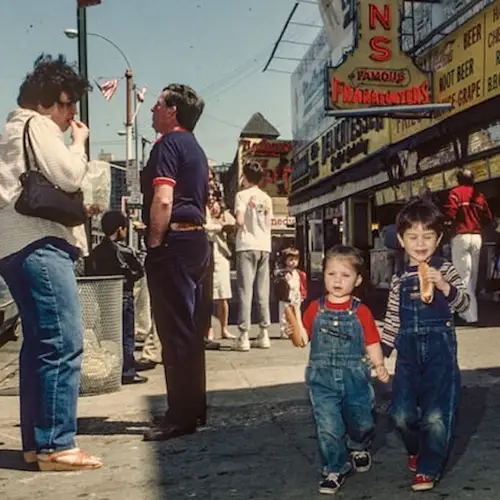Led Zeppelin formed in 1968, and within just three years, they were the biggest rock band in the world — but their meteoric rise to fame was marked by scandal and tragedy.
These photos of Led Zeppelin below follow the band’s trailblazing journey from a small group of British musicians to the biggest rock band of the 1970s.
The rock and roll scene in the late 1960s was undoubtedly a decade-defining movement. Beatlemania was in full force, and the Rolling Stones, The Who, Pink Floyd, and the Jimi Hendrix Experience were pushing the genre to new limits. Musicians were creating sounds people had never heard before — but few were prepared for the shockwave that Led Zeppelin would bring with them.
They were something between a phoenix and Frankenstein's monster, a new beast rising from the ashes and compiled of bits pilfered from other dead groups. Initially known as the New Yardbirds, after guitarist Jimmy Page's former band, the group comprised Page, vocalist Robert Plant, bassist John Paul Jones, and drummer John Bonham.
Led Zeppelin — a name that Page reportedly took from a conversation he'd had with The Who members Keith Moon and John Entwistle — burst onto the scene with a sound that instantly set them apart from their contemporaries.
Their music was powerful thanks to the thick, riff-driven guitar work of Page and the thunderous drumming of Bonham. With Jones' bass tying it all together and Plant's soaring vocals overtop, Led Zeppelin established themselves as a force to be reckoned with. Unfortunately, the band's time was cut short due to tragedy, leaving rock fans wondering to this day what could have been.
Above, look through 33 photos of Led Zeppelin that reveal the band's story both on and off the stage. And below, read more about the groundbreaking group and its lasting impact on rock music.
How Jimmy Page Created One Of The Most Influential Rock Bands Of All Time
Jimmy Page had established himself as a master musician before Led Zeppelin was even conceptualized. He was a well-known session guitarist in the London circuit who joined a band called the Yardbirds in 1966. Two years later, halfway through an American tour, fellow guitarist Jeff Beck left the Yardbirds. Although the band finished touring with Page at the forefront, the rest of the group ultimately decided to pursue new artistic endeavors — and Page was stuck at a crossroads.
While he was making a living — and earning some renown — as a session guitarist, it was hardly the life he'd envisioned. He had also been butting heads with the Yardbirds' manager Mickie Most, who had reportedly been known to reel in Page's more creative musical ambitions in favor of radio-friendly, three-minute pop songs.
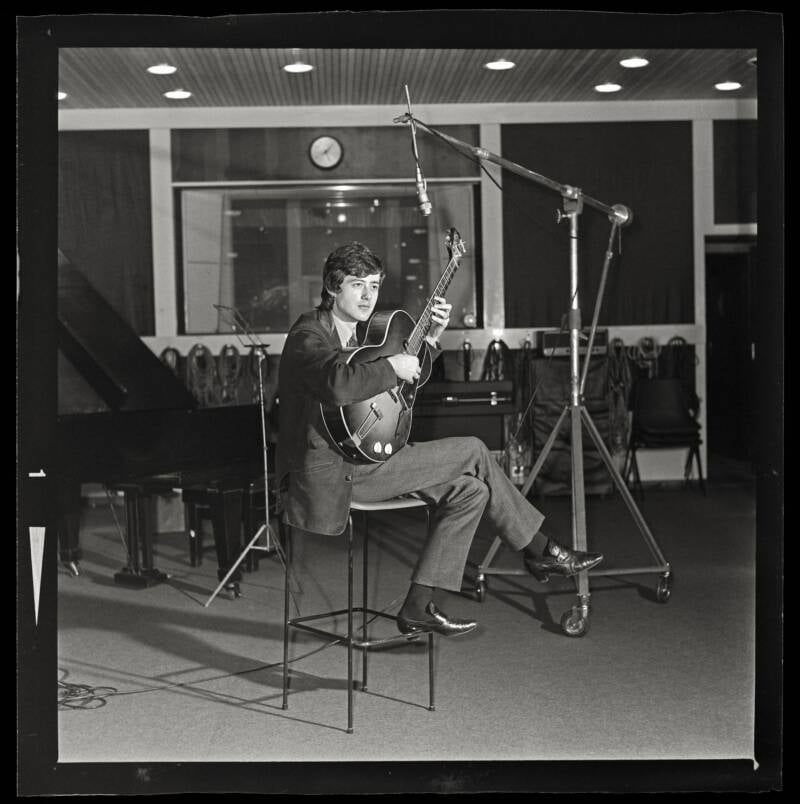
From Original Negative / Alamy Stock PhotoJimmy Page at a London recording studio in 1965, three years prior to the formation of Led Zeppelin.
So, Page ultimately formed his own band. He tapped John Paul Jones to play bass, and he traveled to watch Robert Plant perform after hearing good things about him.
"Robert was fantastic," Page later recalled, as reported by Rolling Stone in 2018, "and having heard him that night and having listened to a demo he had given me, I realized that without a doubt his voice had an exceptional and very distinctive quality." Plant also came with his own recommendation for a drummer: a friend and occasional bandmate named John Bonham.
It was a tough sell — Bonham had a wife and child he didn't want to leave behind, and he was making do as a drummer for Tim Rose — but he eventually agreed, and the band played their first live show on Sept. 7, 1968, under the name the New Yardbirds.
However, they soon changed their name to Led Zeppelin. Back in 1966, Page had been in a recording session with Keith Moon (or, in some versions of the story, John Entwistle) when Moon half-jokingly suggested they form their own "supergroup."
"We can call it Led Zeppelin," Page remembered Moon telling him. "Because it can only go down, like a lead balloon."
And with that, Led Zeppelin was born.
The Meteoric Rise Of Led Zeppelin
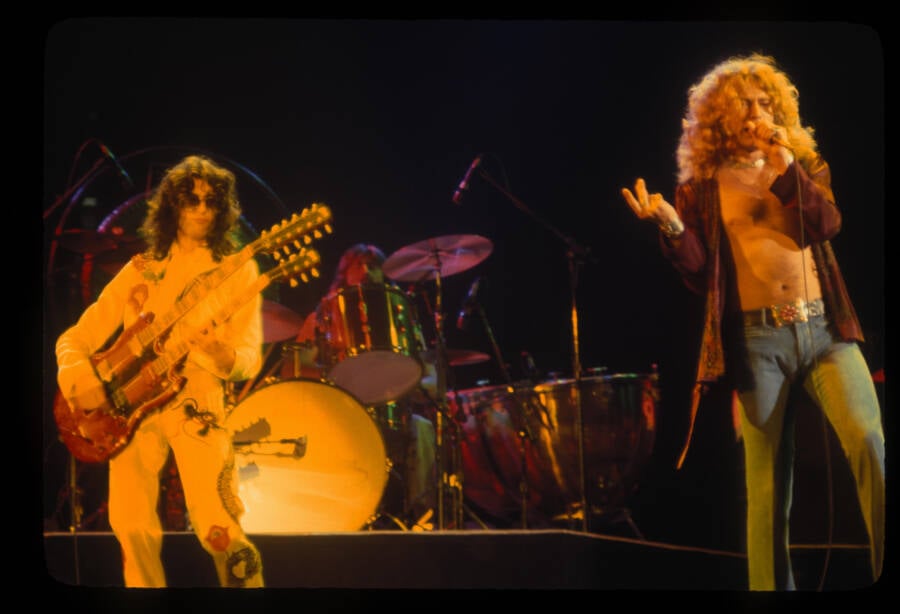
MediaPunch Inc / Alamy Stock PhotoThis photo of Led Zeppelin shows the band performing at the Fabulous Forum in Los Angeles in 1977.
"From the first it was pure enthusiasm. Jimmy doesn't play — he enforces," Robert Plant said in a 1976 interview. "It was the Ultimate Unit we had all been thinking about for years."
The band released their self-titled debut in January 1969 and forever changed both the genre of hard rock and the music industry as a whole.
The founding spirit of the band, after all, stemmed from Page's frustration with being made to produce short, radio-friendly pop tunes. It was his opinion that music should be listened to in album form, beginning to end. He had heard some of the more conceptual records the Beatles had been putting out in the late 1960s, and it was part of what inspired this shift in musical ideology.
"Jimmy's whole idea was that you should play an album in its entirety," Atlantic Records' Phil Carson said in an interview with Louder Sound in 2021. "In those days I would go into a radio station like NWEW with Jimmy and Scott Murray would put on side one of Led Zeppelin II and play the whole f—king thing. Other DJs would pick up on different tracks."
Led Zeppelin rarely put out singles — and even when they did, it was under the condition that the singles be for radio play only and not sold separately in stores. It was specifically noted in their contract with Atlantic Records as well that the band would master their own tracks and have full control over album artwork and single selection. They also refused to do TV performances, because they didn't like how the sound came across — and so if any fans wanted to see them perform, they would have to buy tickets to one of their shows.
If it were any other band, a lack of singles or TV performances would have been a publicity nightmare. In the case of Led Zeppelin, however, it only made the band more alluring. As Carson said, "Any airplay simply made people search out the album. After a while you wondered whether rock bands really needed singles. And in Zeppelin's case they certainly didn't."
The Lasting Legacy Of Led Zeppelin
Between tracks like "Whole Lotta Love" and "Immigrant Song," Led Zeppelin put themselves at the forefront of hard rock. Their music evolved with each album, but it always remained rooted in a blues-rock sound.
Despite the powerful tones of Bonham's drumming and Page's distorted guitar, Led Zeppelin's music was also lyrically and melodically tender at times, showcasing a broad range of styles and emotions. They were a band of juxtapositions, and there is no better example of this than their most popular song, "Stairway to Heaven," an eight-minute track that features every element of what made Led Zeppelin so impactful.
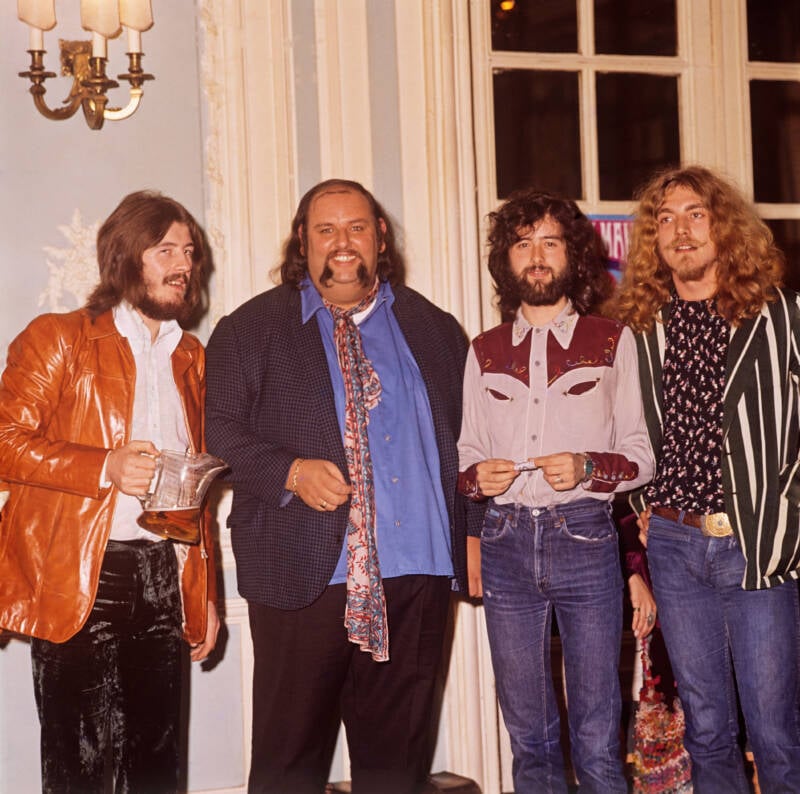
Tom Hanley / Alamy Stock PhotoJohn Bonham, manager Peter Grant, Jimmy Page, and Robert Plant.
The band's raw talent, rigorous touring schedule, and consistent musical output left a permanent mark on rock music and simultaneously made them one of the best-selling groups of all time, with estimated record sales between 200 and 300 million worldwide. Over the course of roughly a decade, they achieved eight consecutive U.K. number-one albums and six on the U.S. Billboard 200. The Rock and Roll Hall of Fame even noted that Led Zeppelin were "as influential" in the 1970s as the Beatles had been in the 1960s.
"The very thing Zeppelin was about was that there were absolutely no limits," Jones once said. "We all had ideas, and we'd use everything we came across, whether it was folk, country music, blues, Indian, Arabic."
Along the way, they also earned a reputation as some of the most hedonistic rockers in the business. Page's fascination with the occult added to the air of mystery about the band — in particular, it led to theories that they made a deal with the Devil to reach fame. Page also raised eyebrows for his relationship with teenage group Lori Mattix.
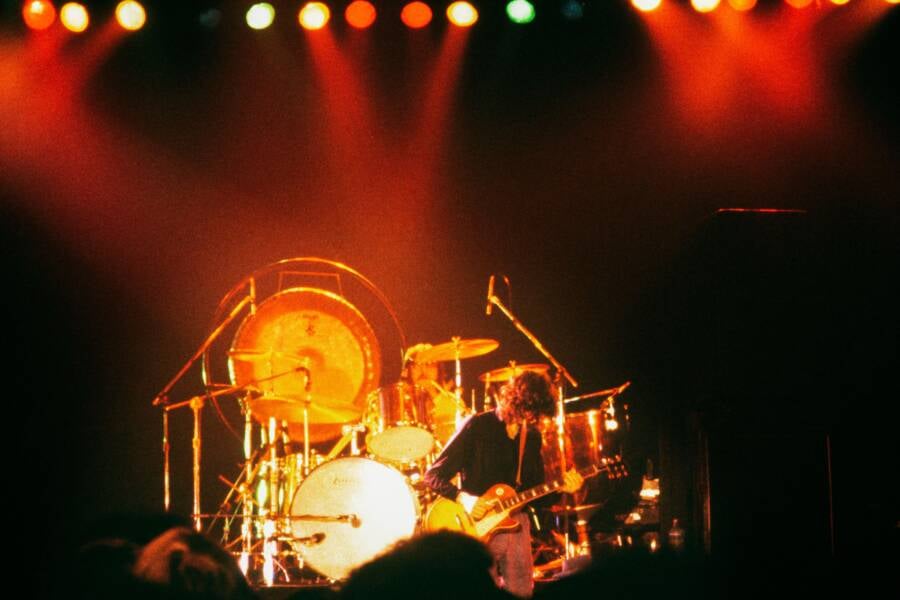
mauritius images GmbH / Alamy Stock PhotoA photo of Led Zeppelin performing the final concert of their European tour in 1980. This show would be their last ever with Bonham, and the last overall until their 2007 reunion.
The band ultimately split at the end of 1980, just a few months after the tragic death of John Bonham. Bonham had long been struggling with alcoholism, and after a rehearsal session for an upcoming American tour, he fell asleep drunk, rolled onto his back at some point in the night, and choked on his own vomit.
Realizing there was no Led Zeppelin without Bonham, Page, Plant, and Jones made the decision to part ways. They briefly reunited on Dec. 10, 2007, in honor of Atlantic Records founder Ahmet Ertegun, and though it was short, it also served as a reminder of how truly legendary the band was. Led Zeppelin may never perform again, but the legacy they left behind is monumental.
After this deep dive into Led Zeppelin photos, learn all about some of rock and roll's biggest groupies. Then, check out 33 photos of some of history's greatest musicians before they made it big.
